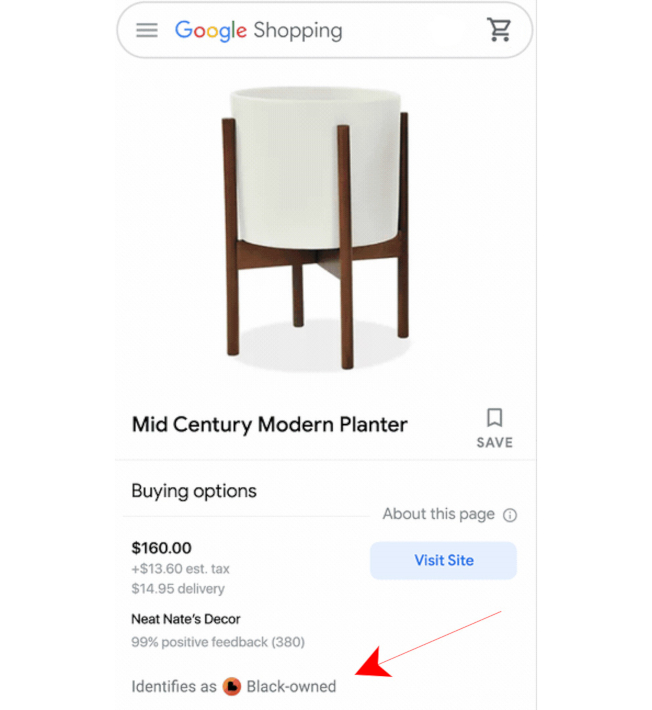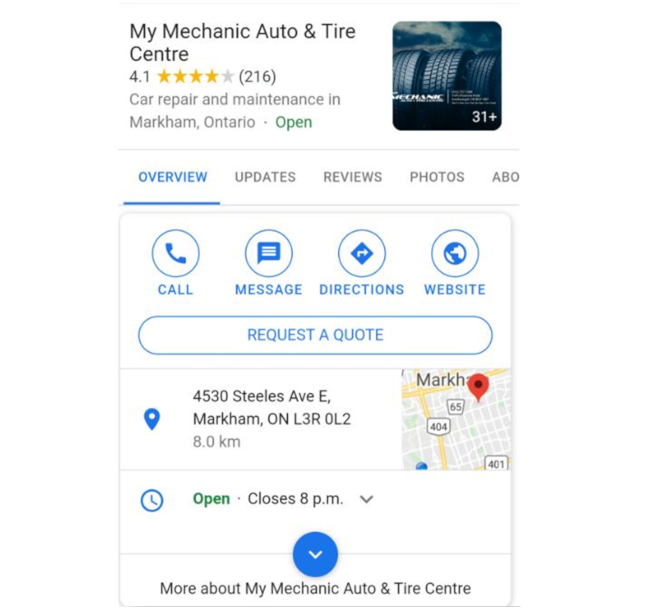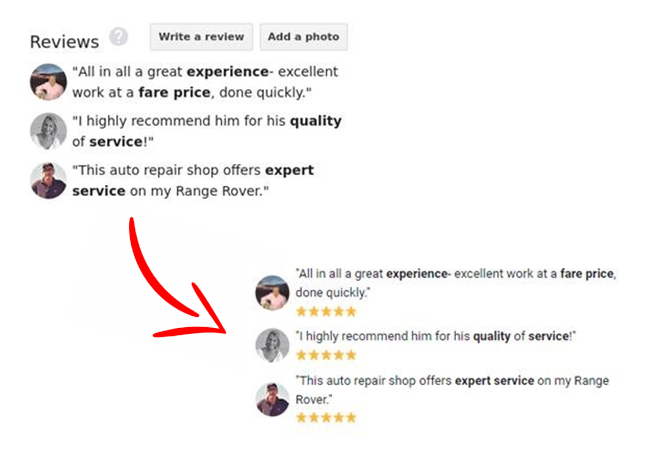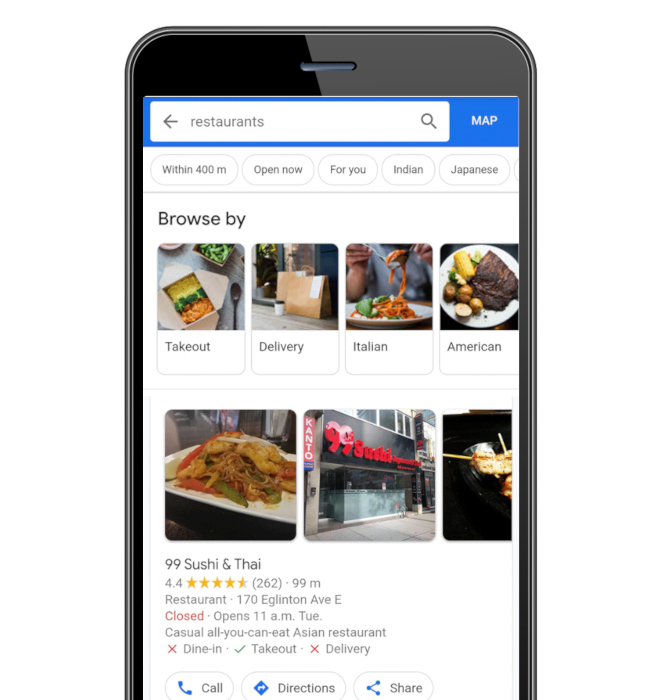Desktop messaging, review snippet stars, restaurant search filters… February’s local search updates may not have reinvented the wheel, but they have improved quality of life for business owners, marketers, and anybody seeking to drive local growth. Let’s get straight to it.
Google adds black-owned business label and scroll-to-text on product results
With the relevant timing of Black History Month, businesses can now add the “black-owned business” label to their Google Shopping listings in Google Search. This label looks just like the Google My Business (GMB) version but shows up on product results within Google Shopping.
Another Google Shopping update came in the form of expanding the scroll-to-text feature to the organic top product listings boxes. The scroll-to-text feature is when you click on a search result in Google, Google then takes you to the web page and scrolls you down the page to the specific passage and highlights the relevant block of text.

As updates to Google Shopping keep coming and more businesses opt in to this digital storefront, Google is constantly looking like a more viable competitor to Amazon. Efforts to expand Google’s ability to act as an online store have been going on for years, but COVID’s online shopping boom hastened this process. Even for stores that are offering pickup over online shipping, Google’s Product Feed allows users to see what items are available in-store. With a business’s digital store presence more important than ever, managers should strongly consider adding Google Shopping to their online marketing strategy.
GMB adds Messaging to desktop
Google Messaging is a very convenient feature for customers but a very inconvenient feature for businesses. Google Messaging allows customers to text rather than call a business for common interactions like quotes, booking, or just checking if a business is open. However, because Messaging was mobile-only, it has been limited to just one cellphone per account. With the move to desktop, businesses can much more easily accommodate messaging on multiple devices.

Businesses can enable messaging through the “Messaging” tab of their GMB dashboard. Turning this feature on also allows the creation of an initial message that is sent to all customers as an auto-reply. Anyone with access to the GMB account will be able to respond to messages. Businesses in certain categories will also see “Get a Quote” or “Request a Booking” buttons appear in their business profiles when messaging is enabled; clicking the button initiates a messaging session.
Google may turn off the messaging feature if businesses habitually fail to respond to messages within 24 hours. Illegitimate messages can be marked as spam and will not be factored into the 24-hour response time. Individual users can also be blocked from messaging the business.
The GMB messaging help page states that all businesses will have access to messaging on the web by early March 2021.
Google adding stars to review snippets in Knowledge Panels
Google is beginning to show star ratings in the review snippets section of the Knowledge Panel. There’s no way to directly control which reviews show up in this snippet section as it is 100% controlled and automated by Google.

Business owners may be concerned that Google seems to include at least one negative review in every review snippets section, with only businesses with 4.3 stars (or higher) avoiding this trend. It is always important to generate great text reviews and the extra focus on Google’s knowledge panel demonstrates that yet again.
Google has also dropped review snippets for attorneys entirely. As the law industry tends to suffer from spam, this is meant to curb fraudulent reviews from gaining even more prominence.
New filter for local restaurant searches
Restaurant searches in Google are now showing a new “browse by” filter, allowing users to find only restaurants of a specified type. This addition is like the already existing “browse by photos” feature but with dining-specific attributes such as takeout, delivery, Chinese, pizza, and other categories.

Restaurants have been particularly hard hit by COVID lockdowns, so any way to stand out in this bear market is a welcome one. With Google making it easier to filter restaurants by specific categories and services, it is imperative that all business include every relevant attribute on their GMB listings. Secondary categories, services mentioned in reviews, and even images of specific food items may be just what your listing needs to become visible to a casual searcher.
Bing and Apple Maps alter their Yelp integrations
The relationship between Bing and Yelp has been in decline in recent months, and it looks like Microsoft’s search engine is looking to sever ties entirely. In fact, Bing has replaced its Yelp reviews with those from Facebook and Foursquare. Yelp reviews can still sometimes be found by clicking into the “Reviews from the Web” section, but Bing looks to be phasing out Yelp where it can.
Apple, on the other hand, is starting to display menu options on some restaurant listings—and their primary source of data looks to be Yelp. This is a viable menu source in the US and Canada, but Apple will need to find other sources of menu information outside of those markets. Wherever Apple tries to pull menu data for Europe, Asia, and elsewhere, it may then choose to use those same sources for the US and Canada, so the clock may yet be ticking for Yelp. This change in Apple is visible both on iOS devices and desktop.
GMB auto-populates services
For the past few months or so, Google has been auto populating the services section of many GMB listing. Businesses should be populating these services themselves but for those that aren’t, it is believed that Google is pulling the services based on the content of the business’s website. Because this is an automatic process without verification, businesses will need to ensure that the services Google populates are complete and accurate.
With Google assuming all services on GMB are what a business offers, it would be greatly detrimental to a business if Google simply assumes anything not listed is something a business does not offer. If you are a pest control service that offers pet-safe fumigation but Google does not add that to your GMB services, you don’t want to miss out on all the leads specifically searching for that offering. Businesses should always try to manage their GMB data themselves and not rely on any automatic features.
The ever-changing local search landscape moves quickly. Want to not only keep up with the latest developments, but get ahead of them to carve out a crucial competitive advantage? That just happens to be our specialty. Let’s talk.




